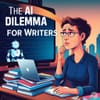Artificial intelligence has become a polarizing force in the writing community, evoking both fascination and apprehension. Initially met with skepticism, AI tools like ChatGPT have gradually been integrated into academic settings, prompting writers to reconsider their stance. While some view AI as a threat to the authenticity of human expression, others see it as a valuable aid in the writing process.
In an English and Gender Studies course, the author was introduced to AI as a writing tool, learning to use it ethically and reflectively. Assignments involved AI-generated prompts linked to course readings, with students encouraged to engage critically with the AI's suggestions. This approach highlighted AI's potential to stimulate new ideas and perspectives, enhancing the writer's creative process.
However, the reliance on AI presents risks, particularly the danger of becoming dependent on it to overcome writer's block. While AI can provide immediate solutions, it lacks the originality and emotional depth inherent in human thought. Over time, excessive dependence on AI may stifle personal creativity and diminish the writer's unique voice.
Ultimately, the decision to incorporate AI into writing practices is a personal one. Writers must weigh the benefits of AI assistance against the potential drawbacks of losing their creative autonomy. By understanding both the advantages and limitations of AI, writers can navigate this technological landscape thoughtfully, ensuring that their work remains authentic and true to their individual expression.


